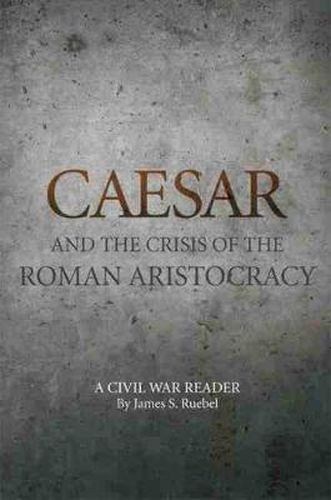Readings Newsletter
Become a Readings Member to make your shopping experience even easier.
Sign in or sign up for free!
You’re not far away from qualifying for FREE standard shipping within Australia
You’ve qualified for FREE standard shipping within Australia
The cart is loading…






One of the Greatest Military and Political Geniuses in western history, Julius Caesar stirs almost as much controversy today as he did in his own time. Neutrality toward Caesar may well be impossible–and according to James S. Ruebel, it is undesirable. In Caesar and the Crisis of the Roman Aristocracy, Ruebel introduces students of Latin to Caesar and the civil war that Pompey led against him from 49 to 48 B.C. By presenting the Roman leader in his own words and those of his contemporaries, the book forces readers to confront the same choices that Cicero and others faced in this tumultuous period.Ruebel places the readings in historical context in his introduction, and then presents substantial portions of Caesar’s De Bello Civili in Latin. Extracts from the writings of Caesar’s contemporaries (most in English translation), along with Ruebel’s commentary and notes, further illuminate Caesar’s account for students and invite them to grapple with such issues as personal honor, morality, leadership, patriotism, and the justifications for civil war.
$9.00 standard shipping within Australia
FREE standard shipping within Australia for orders over $100.00
Express & International shipping calculated at checkout
Stock availability can be subject to change without notice. We recommend calling the shop or contacting our online team to check availability of low stock items. Please see our Shopping Online page for more details.
One of the Greatest Military and Political Geniuses in western history, Julius Caesar stirs almost as much controversy today as he did in his own time. Neutrality toward Caesar may well be impossible–and according to James S. Ruebel, it is undesirable. In Caesar and the Crisis of the Roman Aristocracy, Ruebel introduces students of Latin to Caesar and the civil war that Pompey led against him from 49 to 48 B.C. By presenting the Roman leader in his own words and those of his contemporaries, the book forces readers to confront the same choices that Cicero and others faced in this tumultuous period.Ruebel places the readings in historical context in his introduction, and then presents substantial portions of Caesar’s De Bello Civili in Latin. Extracts from the writings of Caesar’s contemporaries (most in English translation), along with Ruebel’s commentary and notes, further illuminate Caesar’s account for students and invite them to grapple with such issues as personal honor, morality, leadership, patriotism, and the justifications for civil war.